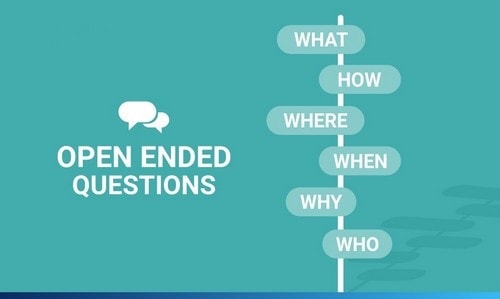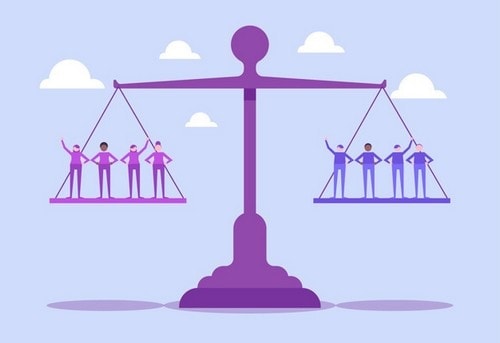An unstructured interview is a type of interviews where interviewer doesn’t have a list of pre-prepared questions. These are a type of non-directive interviews and are exactly opposite to the structured interviews where a candidate is asked questions from the standard list of questions. However, in structured interviews interviewer can prepare a list of questions to be asked about a particular topic.
For example, questions on the topic “Flow of income in an economy” can be prepared beforehand to be asked while interviewing an economic analyst. Unstructured interviews are unrestrictive and informal in nature. Unlike structured interviews, unstructured interviews are free flowing and are much like a day-to-day conversation between two people.
In this type of interview, questions are spontaneous and are usually directed on the basis of responses of an interviewee. Unstructured interviews are suitable to ask open questions and get deep knowledge of the interviewee on a particular topic. However, these interviews are not suitable in situations where multiple candidates are being interviewed for a single post, because it becomes unreliable and difficult to compare the responses of candidates.
In the following sections, you will learn about the characteristics, advantages, disadvantages, and things to keep in mind while conducting an unstructured interview.
Table of Contents
Characteristics of an unstructured interview
1) Open-ended Questions
In this type of questions, the interviewer doesn’t expect a particular answer. An answer to open-ended questions varies from interviewee to interviewee. An interviewee can give direction to the interview on the basis of his response when asked open-ended questions. only an expert interviewer can get the hold of the interview back in his hand.
These questions enable interviewees to talk about their skills and capability and provide details about them. In addition to this, Open-ended questions are suitable for both qualitative and quantitative studies. However, these questions are more preferred by researchers while conducting a qualitative study, because asking open-ended questions get detailed and in-depth responses from the respondents.
2) Spontaneous
In unstructured interviews, interviewers or researchers don’t prepare a set of questions to be asked in interviews. however, they prepare main questions to be asked about a certain topic so that they can gather in-depth information about that topic.
On the other hand, they concentrate more on follow-up questions and probing questions which they form on the basis of the respondent’s response on the spot. An interview can ask questions related to education, career, work, and hobbies etc. to start and continue an interview. however, it is not necessary to ask questions about each of the above-mentioned topics. These topics are helpful to kick-start and keep the interview going. Semi-structured interviews are those where a little bit of preparation is done before conducting an interview.
3) Silence
Structured interviews are those where questions are asked one after the other. Therefore, there is no chance of silence between the interviewer and interviewee. But as unstructured interviews are like a day-to-day conversation, therefore, there are ample chances of silence to occur.
Sometimes, silence takes place naturally like interviewer cannot think of a question immediately or the end of knowledge of interviewee on the topic he is asked a question about and sometimes, silence is used intentionally to check the patience level of the interviewee and to check his reactions.
However, in qualitative study silence is ignored, because of its multiple meaning perceived such as resistance in sharing information, or end on the knowledge on a topic or cultural way of self-representation. Sometimes silence occurs due to the inability of an interviewer to carry on the conversation and sometimes, silence is introduced in the interview process purposely.
4) Neutral analysis or non-biased analysis:
Structured interviews offer social interaction and various approaches to communication between the interviewer and interviewee. Some people are of the opinion that the interviewer should on encourage interviewee by showing any sign of encouragement like by nodding or giving responses like yes, very interesting etc.
Doing this interviewer makes the interview unbiased and the information obtained is not as it should be. However, others say that if interviewer gives responses it encourages interviewer to talk more and more. In this way, you can get huge information about them. However, biased responses are mostly avoided in qualitative interviews, because it may alter the information.
Advantages of Unstructured interviews
1) Flexible and comfortable
In unstructured interviews, questions are not pre-determined and usually, these interviews flow like a normal conversation. Therefore, candidates feel more comfortable in unstructured interviews. unlike structured interviews, they are informal and flexible.
In addition to this, a candidate can explain concepts in an informal way which shows their clear understanding of the subject rather than the bookish knowledge. A candidate does not have to mug up concepts in be in unstructured interviews. therefore, these interviews are comfortable for both interviewer and interviewee.
2) Better understanding about the interviewee
Unstructured interviews are best to understand an interviewee because, in these interviews, candidates have the opportunity to talk freely. Therefore, they represent themselves better and the interviewer can know about their various skills and talents. For example, if a candidate is asked how will he increase the sale of a newly launched product.
The candidate will answer this question by explaining different techniques that he may use to boost the sales and interviewer can ask next questions on the basis of the answer provided by him. Therefore, unstructured interviews provide a better understanding of a candidate.
3) Interactive method and balance of power
Unlike other interviews, candidates have the power to carry on the conversation in unstructured interviews. Unstructured interviews are less like question-answer type interview and more like conversation type interview. Candidates have equal opportunity to ask questions to interviewers and they can also introduce topics that they are prepared to talk about or they have expertise in.
Because of their conversation like structure, an interview can clarify their doubts about things that they didn’t understand and they can also ask the candidate to provide more examples to get a better understanding about the topic. Hence, unstructured interviews are interactive and balanced.
4) A practical way to analyze a candidate:
In unstructured interviews, more questions are asked which could be answered on the basis of past experiences of a candidate and fewer questions whose answers are based on bookish knowledge are asked. An interviewer can ask a candidate about his actions or reaction about various practical work scenarios. In this interviewer can make sure that candidate is capable to work for their organizations.
5) No communication gaps between interviewer and interviewee
In unstructured interviews, questions are informal and spontaneous. Therefore, they enable interviewer and interviewee to have a discussion about various topics rather than having the answers in bookish language.
6) Provides an opportunity to an interviewer to attract candidates towards their organizations
Apart from salary, job profile, and work hours, there are various aspects like work environment, employers’ behavior towards their employees, additional benefits etc., that a candidate considers before becoming a part of an organization. Therefore, an interviewer can use unstructured interviews to talk about the organization and can also ask about the candidates’ expectations from the organization.
7) Complex discussions
Complex topics can be discussed in unstructured interviews. There are various complex aspects of a job, which cannot be discussed in detail in structured interviews. however, in unstructured interviews, because of two-way communication complex topics can be discussed in detail and candidate’s knowledge about that topic can be assessed in-depth.
Disadvantages of unstructured interviews
1) Time-consuming
Unstructured interviews are time-consuming because questions for this type of interview are not pre-determined. These interviews are discussion-based therefore, they last longer than other interviews. Some questions are asked to at the beginning of the interview to warm up a candidate and to him feel comfortable. These questions have nothing to do with the interview process and they consume a lot of time of the interview.
2) Chances of diversion from the purpose
There are high chances that such interviews get diverted from the original purpose of the interview. sometimes, a discussion on one topic lasts so long that interviewer might forget to ask questions which are important for the interview.
3) Difficulty in comparing data of various candidates
In structured interviews, the same set of questions are asked to all candidates which enable interviewers to analyze and compare the answers of different candidates with others. To determine the performance of candidates and to choose the most potential candidates among others. It is difficult to compare the data of different candidates in unstructured interviews because candidates are not asked the same questions. Interviewer finds it difficult to select a potential candidate because everyone has different key skills.
4) Not suitable for certain candidates
There are a few candidates who have certain skills to get the job, but they don’t perform well in informal interviews because of their introvert or shy nature. Informal interviews are not for these candidates. Such candidates are less likely to get selected in informal interviews and there are high chances that an organization might lose a potential candidate.
5) There are chances to create a negative opinion about the organization
Candidates can make a negative opinion about the organization, because of the informal structure of the interview. He might perceive that the organization might lack professionalism.
6) Confidential information can be revealed mistakenly
There are chances to have a discussion on official topics while conducting an unstructured interview. There is a possibility that an interviewer might utter information like a product launch, secret projects etc. inflow during an unstructured interview. Therefore, an interviewer should always stay aware of the purpose of the interview and share information which is necessary with the interviewee.
Steps in Conducting an Unstructured Interview
Followings are the factors that one should keep in mind while conducting an unstructured interview.
- Ask questions which are only about the candidate’s skill sets. Avoid asking questions which are irrelevant to the interview. This will get you valuable information about the candidate and will also save you time.
- Don’t forget the purpose of the interview. Ask questions only which are relevant to the interview’s purpose and get back your conversation back if deviated from it.
- Keep the conversation minimal. Ask to the point question and if necessary, ask the candidate to provide an explanation about a certain answer. Otherwise, you will find yourself stuck with talkative candidates because they don’t know where to stop.
- The interviewer must be experienced and must have the first-hand experience on how to conduct unstructured interviews. because gather information from unstructured interviews is not an easy task.
Liked this post? Check out the complete series on Interviews







